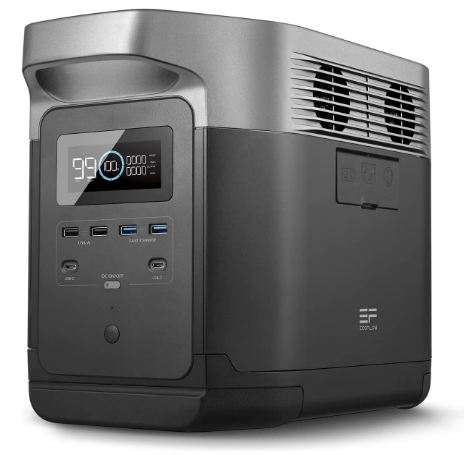The EcoFlow Delta 1300 is a mid-size portable power station that’s powerful enough to power appliances during a power emergency and light enough for use in RVs, camping and outdoors.
Like most other EcoFlow power stations, the Delta 1300 comes with super fast charging via AC and solar.
Read on for my in-depth EcoFlow Delta 1300 review.
If it’s not what you are looking for, see my reviews of the best 2000W solar generators for other options in a similar size range.
I have also included three alternatives to the Delta 1300 at the end of this review.
EcoFlow Delta 1300 Pros & Cons
Pros
Cons
Best Features
1260Wh Li-ion Battery
In terms of capacity, the EcoFlow Delta 1300 is a midsize solar generator. It’s not quite as small as many popular camping power stations like the Jackery 500, but it’s also not big enough to power an entire RV or provide days of backup power at home.
The 1260Wh capacity is ideal for those who plan to power a couple or so smaller appliances (like a mini fridge and coffee maker) as well as run or charge electronics like lights, a smartphone phone, and camera.
What can the EcoFlow Delta 1300 Power?
Appliance/device | Run time/recharges |
CPAP (40W) | 21hrs |
Mini fridge (60W, DC) | 19hrs |
Smartphone (11Wh, USB) | 104 recharges |
Laptop (60Wh, USB-C) | 19 recharges |
Blender (500W) | 2.1hrs |
Projector (65W) | 13hrs |
50” TV (110W) | 8hrs |
Electric drill (1080W) | 1hr |
1800W Power Output
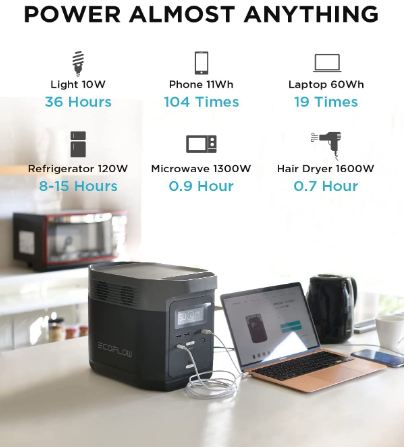
The Delta 1300 stands out from most power stations in that battery capacity and power output are not closely matched.
With most power stations, the two are usually about the same. The Delta 1300 produces a lot of power for its capacity.
So despite its limited capacity, it’s able to run most household appliances. You can plug in a TV, full size fridge, coffee maker, a microwave and so on.
By the way, many EcoFlow solar generators share this trend. For instance, the Delta Mini has a capacity of 882Wh but can produce up to 1800W of power with X-Boost. The EcoFlow River mini has a capacity of just 210Wh, but can power 600W appliances with X-Boost.
Interestingly, the Delta 1300 lacks the X-Boost feature present in several other EcoFlow models that increases power output beyond the rated amount. But 1800W is plenty for most users.
13 Outlets
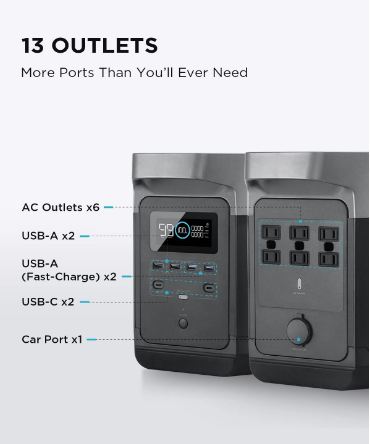
For its size, the EcoFlow Delta 1300 has an impressive number of outlets.
Many users will appreciate the six AC outlets that let you plug in multiple appliances and electronics at the same time.
And since you have 1800W of power to play with, you can run multiple smaller appliances without going past the load limit.
You also get plenty of USB outlets to power and charge your devices.
There are two regular USB-A ports (5V, 2.4A), two Quick Charge USB-A ports (18W) and two USB-C ports (60W).
This makes the Delta 1300 a great pick if you travel with multiple gadgets and devices like a laptop, tablet, smartphones, Bluetooth speaker, drone, cameras and so on.
I just wish there was a wireless charging pad like the one on the EcoFlow River Mini.
As for DC power, the Delta 1300 has just one 12V car port.
X-Stream Fast Charging
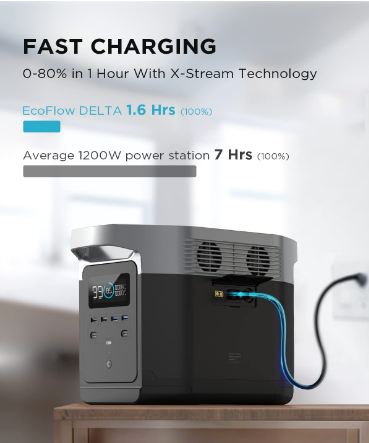
EcoFlow solar generators have some of the fastest charging speeds in the market. EcoFlow calls their fast charging technology X-Stream and it’s present in all their River and Delta models.
X-Stream charging allows the Delta 1300 to take in a lot of power using the regular AC charger that’s included.
You don't need to get a special high-powered charger as with Goal Zero power stations or buy a second charger like with Bluetti power stations.
The Delta 1300 charger inputs up to 1200W of power, which charges the battery to 80% in just 1 hour and 100% in about 1.6 hours.
This lets you get back to powering appliances and electronics quicker.
Charges Fast With Solar
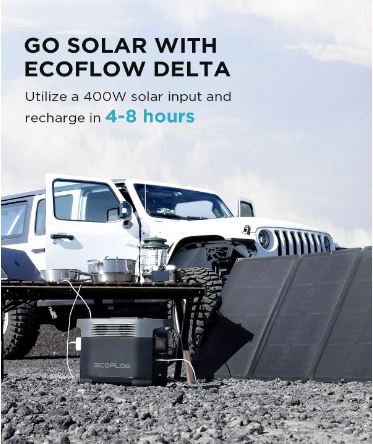
Charging with solar is a bit slower than with AC, but still pretty fast.
The Delta 1300 can take in a max of 400W of solar power (10-65V). If you set up a 400W array, it’ll take 4-8 hours to recharge the power stations depending on how much sun you get.
On most days, you’ll be able to recharge the Delta 1300 in a day.
When you are on the road, you can also plug in the Delta 1300 into your vehicle’s 12V/24V outlet. But this option is more ideal for topping up the battery. A full recharge takes 13.5 hours.
Good Portability
The EcoFlow Delta 1300 strikes a great balance between power and portability.
It’s powerful enough to power appliances yet light enough that you can carry it around with you. It weighs 30.9lbs and comes with an integrated handle.
Emergency Power Supply
The EcoFlow Delta 1300 can provide emergency power supply automatically in case of a blackout.
To use the EPS feature, plug the Delta 1300 into a wall outlet using the AC charger then connect whatever appliance or machine you want to keep on into one of the AC outlets on the power station.
In case of a blackout, the Delta 1300 switches from grid power to its own power within 30ms.
Issues & Limitations
Here are a couple areas I think the EcoFlow Delta 1300 falls short.
Limited Capacity
The Delta 1300 has impressive power output, but its capacity is limited. While the power station can comfortably handle large appliances like a fridge or microwave, the battery drains quickly.
1260Wh is not a lot when powering large or multiple appliances.
That is why, despite the high power output, I still recommend using the Delta 1300 for running small and mid-size appliances (less than 1000W) in addition to powering electronics and devices.
Limited Lifespan
The other limitation of the Delta 1300 is the battery chemistry.
It uses a Li-ion battery, instead of LiFePO4. The upside is that Li-ion batteries are smaller and lighter. That’s the main reason the Delta 1300 is highly portable.
The downside is that Li-ion batteries don't last as long as LiFePO4 batteries. The Delta 1300 has a cycle life of 500-800 cycles to 80% capacity and a total lifespan of about 2500 cycles (about 3-5 years of normal use)
In contrast LiFePO4 power stations like the new EcoFlow Delta 2 have a cycle life of 2500+ cycles to 80% and can last over 5000 cycles (5-10 years of normal use).
Alternatives To The EcoFlow Delta 1300
Not sure the Delta 1300 is the right solar generator for your needs? Here are three alternatives to consider.
EcoFlow Delta Max - More Power and Capacity
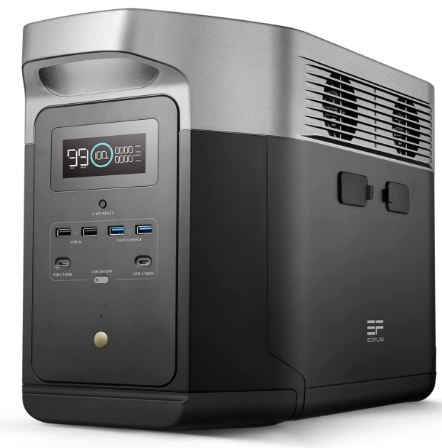
If you need more power or capacity than the Delta 1300 offers, upgrade to the next big power station — the EcoFlow Delta Max.
The Delta Max has a capacity of 2016Wh and a power output of 2400W. So you can power large and multiple appliances without draining the battery too fast.
The Delta Max comes with the X-Boost function that lets you crank output to 3400W to power even bigger appliances. It will drain the battery fast but is handy in an emergency when you need to power something like an AC or heater.
If you need even more capacity, the Delta Max is expandable. You can connect two extra battery packs to get a total of 6048Wh capacity. This is great for home backup or powering an RV or van.
The Delta Max also has X-Stream charging that charges it to 80% in 65 minutes.
You get pretty much the same outlets in the Delta Max as the Delta 1300. But the Max model has more powerful 100W USB-C ports and 2400W AC outlets.
Jackery Explorer 500 - Lighter & More Portable
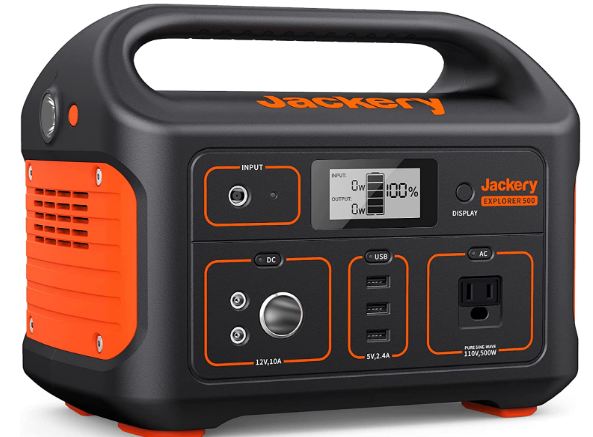
If portability is your main concern, consider going with the Jackery Explorer 500. It’s not nearly as powerful or as big as the Delta 1300, but it’s much lighter and easy to handle on camping trips.
The Jackery 500 weighs just 13.3lbs, so you can easily carry it by hand (though I don't recommend it for backpacking - it’s a bit too heavy and bulky for that).
It has a 518Wh Li-ion battery and a 500W AC inverter. So you’ll be limited to running small appliances like a car fridge, CPAP, fan and so on.
It also supports multiple devices via three USB-A ports. Unfortunately, it lacks USB-C and QC USB-A ports.
You also get three DC outlets.
EcoFlow Delta 2 - LiFePO4 Battery
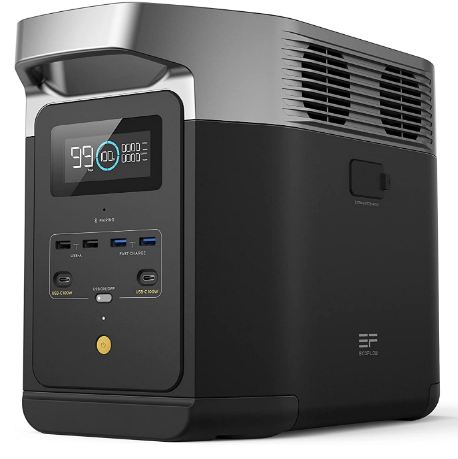
If your main issue with the Delta 1300 is the Li-ion battery, you’ll be happy to know that EcoFlow recently launched a new almost similar sized power station with a LiFePO4 (lithium phosphate) battery.
The EcoFlow Delta 2 has a 1024Wh capacity and produces 1800W of AC power (2200W with X-Boost).
The LiFePO4 battery can last up to 10 years and it’s more stable than a Li-ion battery. The only downside is that it’s heavier than other 1000Wh solar generators like the Jackery 1000.
But at 27lbs, it’s lighter than the Delta 1300, so you can still take it with you on outdoor adventures.
The Delta 2 has several other advantages over the Delta 1300:
In my opinion, the new EcoFlow Delta 2 is better in almost every way compared to the Delta 1300. It lasts longer, has X-Boost, charges faster with solar, has an app, has more outlets, and it's lighter.
They cost about the same, making the Delta 2 the better bargain.
Care and Maintenance
Here are some tips for taking care of the EcoFlow Delta 1300 solar generator.
Warranty
EcoFlow offers a 24 month warranty on the Delta 1300.
Specifications | |
|---|---|
Weight: | 30.9lbs |
Size: | 15.7 x 8.3 x 10.6 in |
Capacity: | 1260Wh |
AC output: | 1800W continuous, 3300W surge pure sine wave inverter |
Outlets: | 6xAC, 2xUSB-A, 2xQC USB-A, 2x60W USB-C, 1x12V DC |
Max solar input: | 400W |
Charging time: | 1.6hrs with AC adapter, 4-8 hours with 400W solar |
Battery chemistry: | Lithium-ion |
Battery lifespan: | 800 cycles to 80% |
Operating temperature: | 32 to 113°F charging, -4 to 113°F discharging |
Where To Buy
You can order the EcoFlow Delta 1300 from EcoFlow’s official website. The power station is also available on Amazon.

